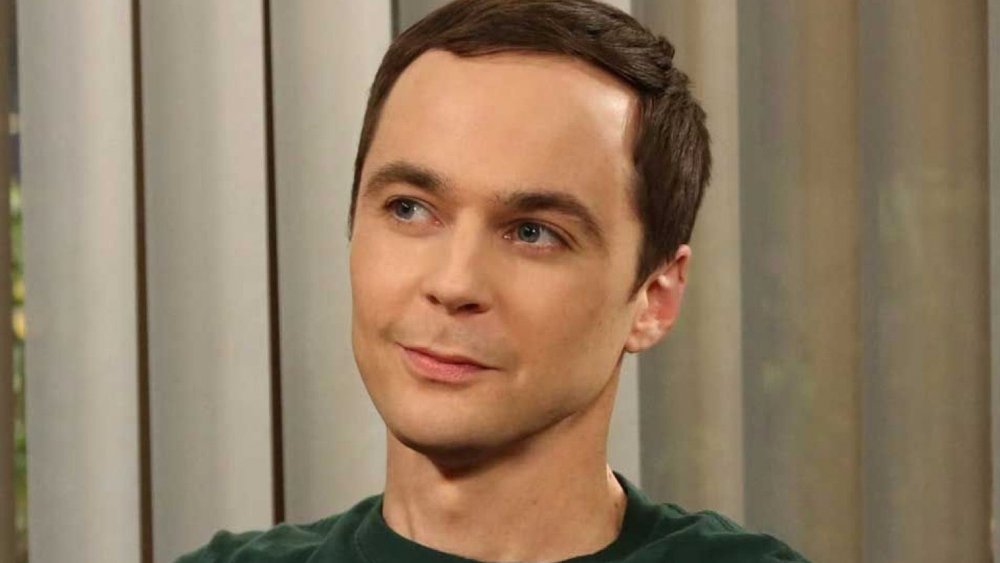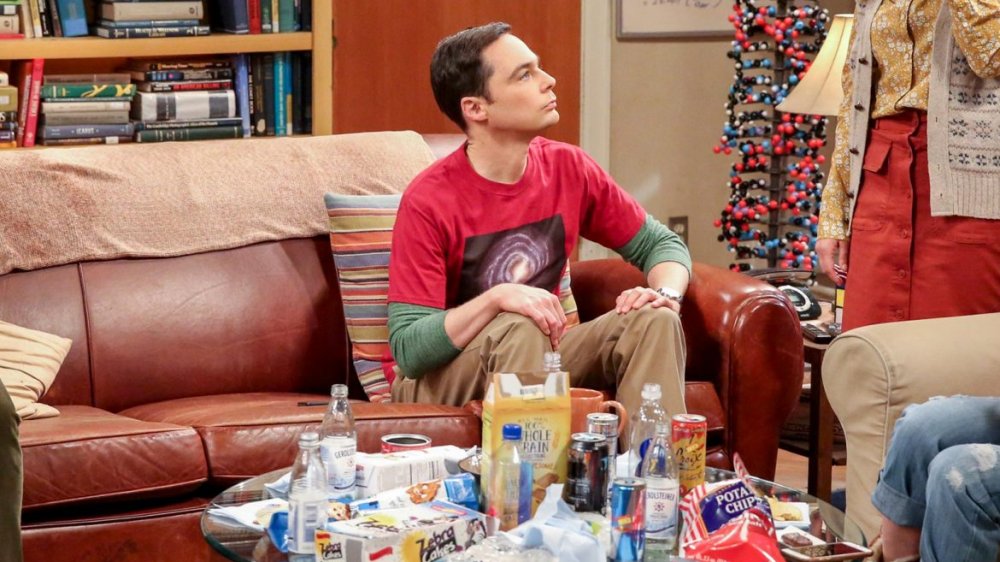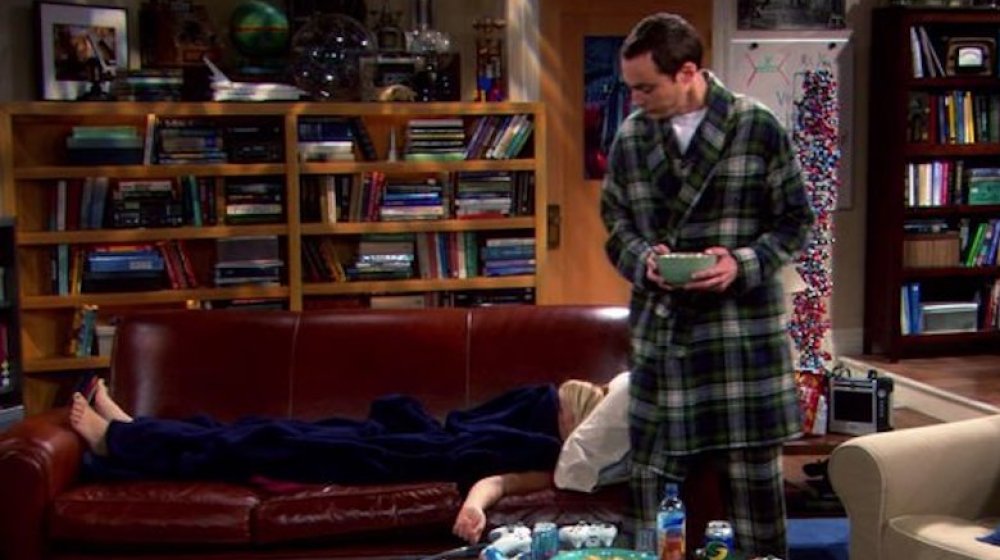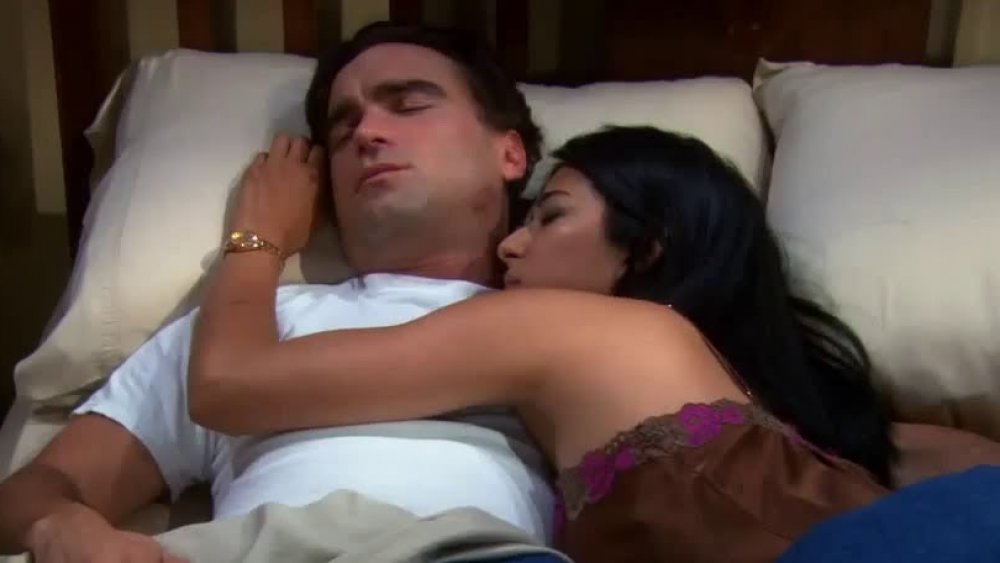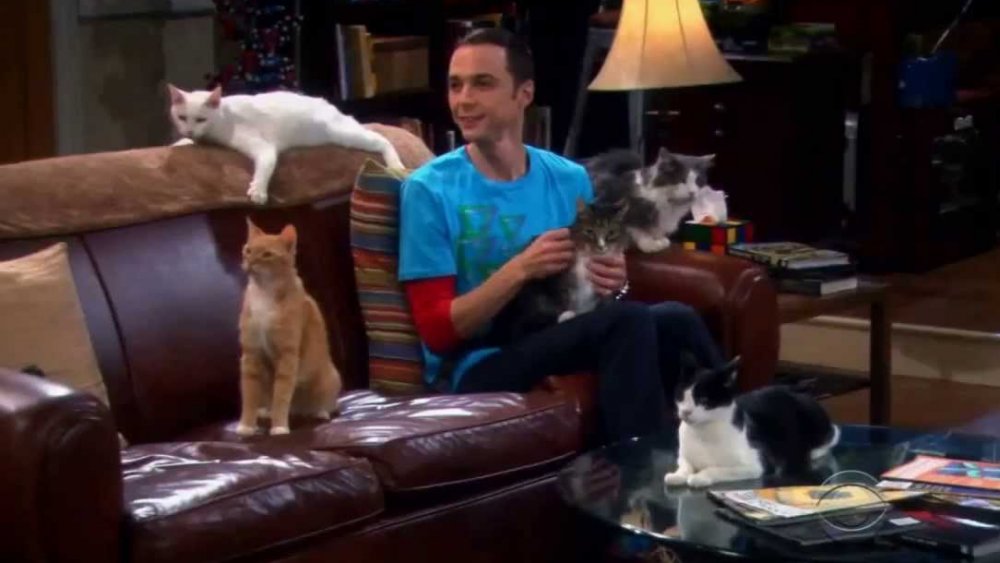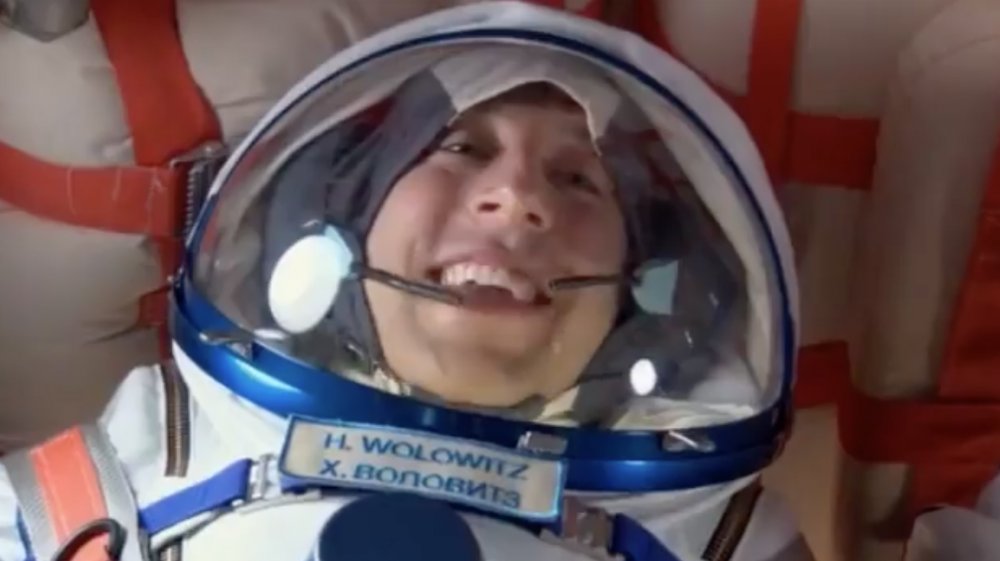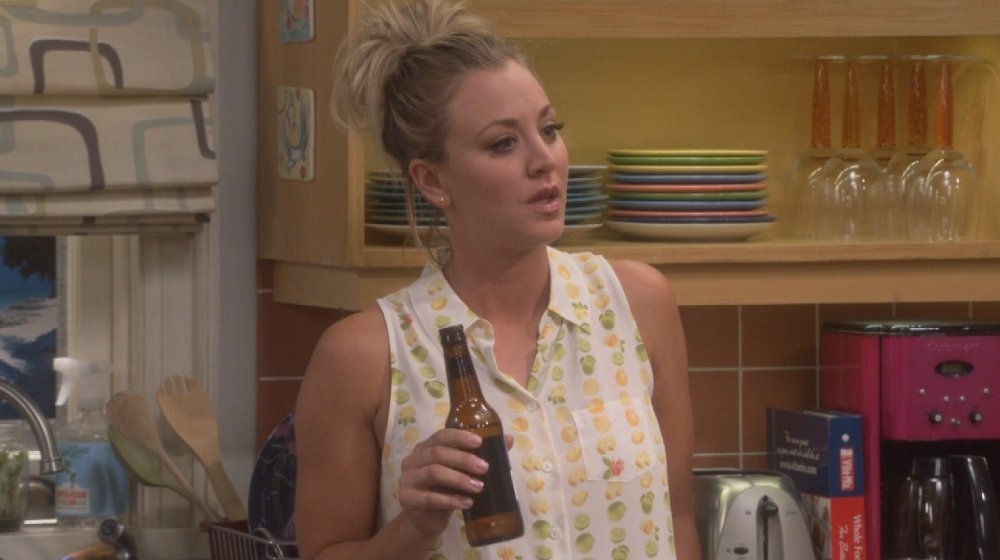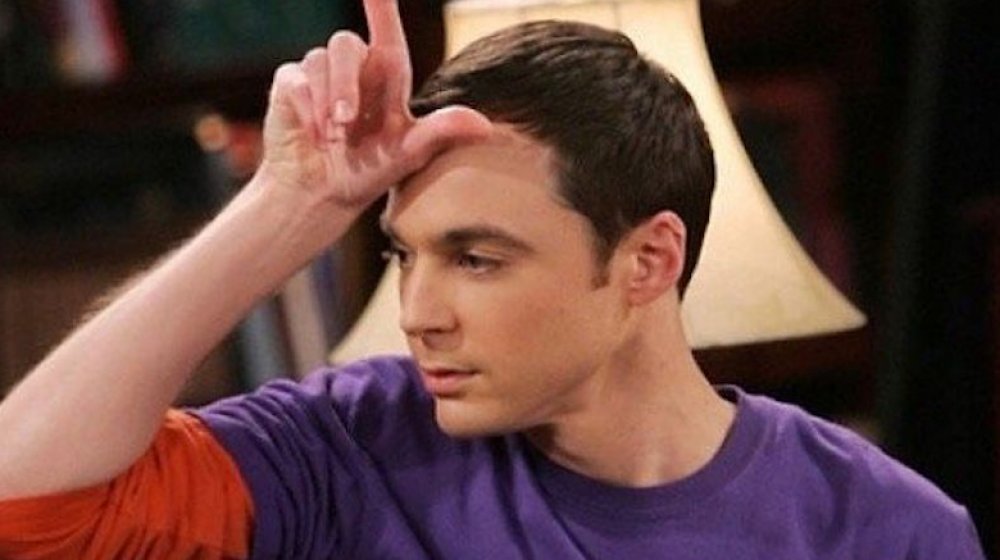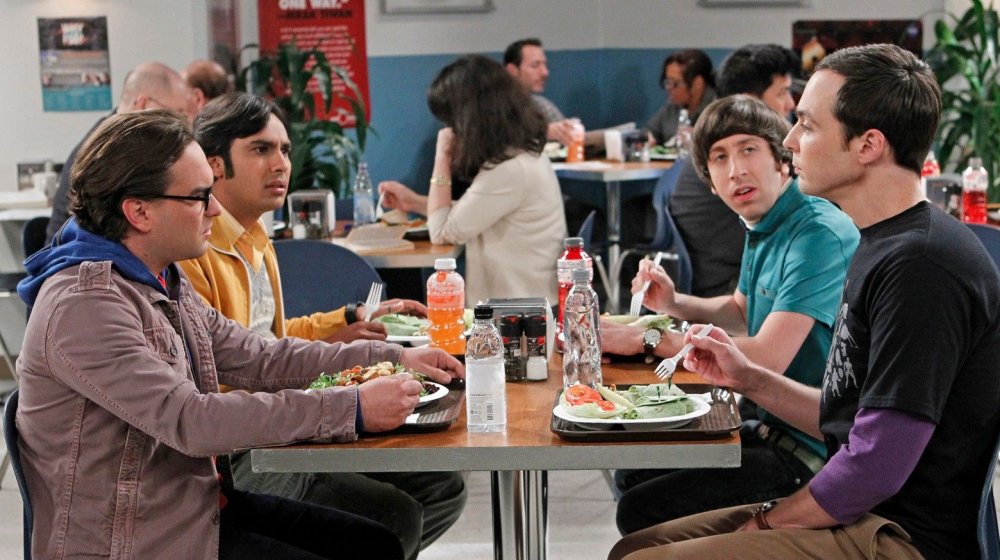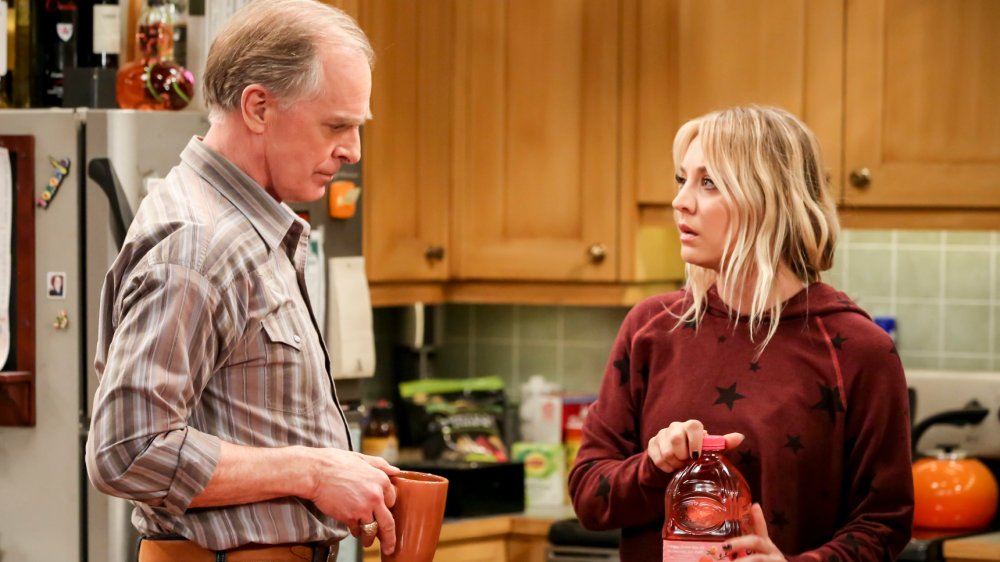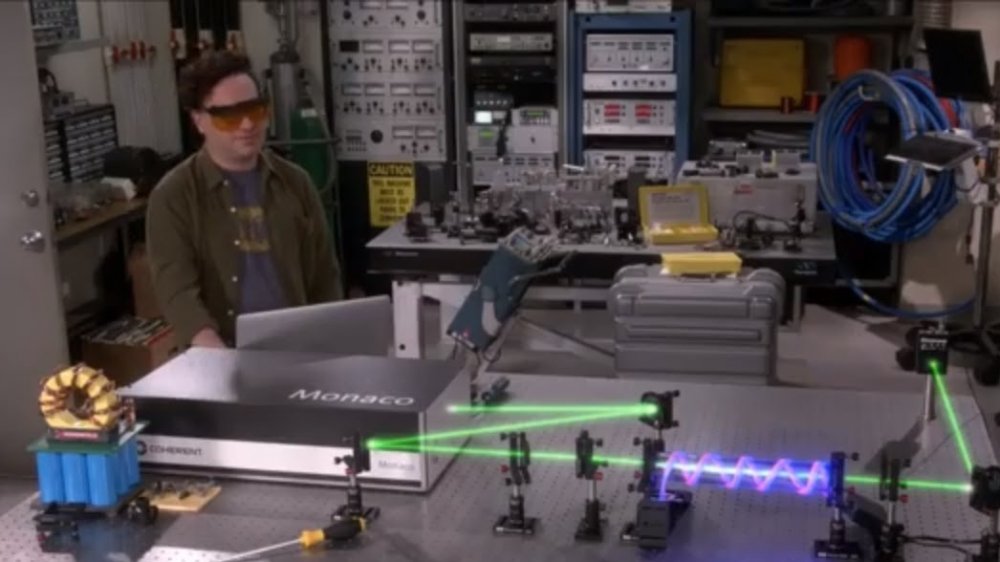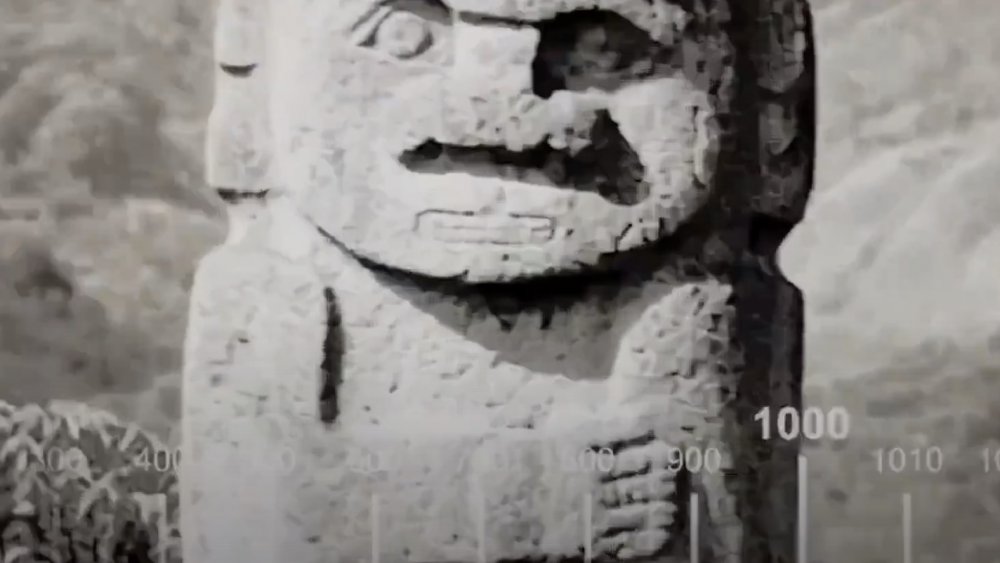The Biggest Onscreen Mistakes In The Big Bang Theory
The Big Bang Theory is one of the most popular sitcoms of all time, and certainly one of the most notable of the past 20 years. Ranking near the top of Nielsen's most-watched charts for most of its record-breaking 12-year run, the show has become a pop culture icon. Given the fact of its pervasive reruns on local stations, cable, and on HBO Max, it'll likely be part of the TV landscape for years to come.
The Big Bang Theory is an audiovisual security blanket for many: A reliable show that is happily the same, episode after episode. For example, scientist Sheldon Cooper will always be an incorrigible jerk, his long-suffering best friend Leonard will suffer the consequences, and Howard will act like a buffoon. But in spite of its remarkable consistency, The Big Bang Theory is sometimes ... inconsistent. Yes indeed — over the course of nearly 300 episodes, writers sometimes forget certain plot points and actors occasionally lose touch with their characters. Here are the times when The Big Bang Theory made egregious goofs that are hard to overlook.
Sheldon's special couch spot isn't so special
Sheldon Cooper is a creature of habit. Perhaps because he is a scientist striving to find meaning and order in a chaotic universe, he exerts control over nearly every part of his life. This manifests in his strict dinner schedule and his "spot." It's well understood among his social circle that no one is to sit on the far right end of the brown couch in the apartment's living room, except Sheldon. He has called that comfortable and familiar spot a "single point of consistency" in a world in flux, upon which he has placed "eternal dibs," in part because it has a good angle of the TV and never gets too hot or too cold. On the prequel show Young Sheldon, young Sheldon has a similar spot of preference in his school cafeteria.
Nevertheless, The Big Bang Theory's directors sometimes forget about this major element of Sheldon's character, and allow other people to sit in the hallowed spot, even while Sheldon is in the room. It's weird that someone so adamant about his seat on the couch doesn't notice or mind when Raj or Howard occupies it, but hey — that's TV for you.
Sheldon forgets what day it is
Sheldon Cooper's strict approach to the calendar applies to everything from meal planning to his leisure activities. Early in the show, it's established that Sheldon and the guys have a weekly standing date to play the video game Halo every Wednesday night. Penny hits Sheldon and Leonard's apartment during one session and mentions that Christy, her friend from back home in Nebraska, showed up uninvited and is staying at her apartment. Upon hearing that Christy is promiscuous, Howard flees the game and goes across the hall to proposition her, and the two wind up using Penny's bedroom to hook up. Penny, with nowhere to sleep that night, crashes on the couch in Sheldon and Leonard's place.
That's all well and good until the next morning, when a robe-clad, bowl-of-cereal-clutching Sheldon is mad that a sleeping Penny has interrupted his Saturday morning tradition of watching Doctor Who. Either The Big Bang Theory writers goofed up and forgot that the previous evening was Wednesday ... or Penny slept continuously from Halo Night to Saturday morning.
The girlfriend clause is repeatedly and flagrantly violated
Roommate disputes are voluminous and varied on The Big Bang Theory, especially between precise Sheldon and exasperated Leonard. As a preemptive measure — and to make sure his home life strictly adheres to his tastes in every way — Sheldon draws up a lengthy and elaborate "Roommate Agreement." Its existence is referred to often, as are its comically numerous articles, riders, and clauses. A "girlfriend clause" is explored in the 2008 episode "The Vartabedian Conundrum." Per Sheldon's legalese, any relevant woman is considered to be cohabiting with Leonard (and thus Sheldon) and is subject to all the rules and costs of such if she stays over for 10 straight nights, more than nine total nights over three weeks, plus all the weekends of a month, plus three weekdays.
Even though this Roommate Agreement gets brought up throughout The Big Bang Theory, Leonard violates the "girlfriend clause" with regularity and there's little to no fallout. All of Leonard's female romantic partners stay over, and stay over often, including Stephanie, Priya, and Penny, with little incident.
Sheldon is supposed to be allergic to cats
For the first few seasons of The Big Bang Theory, Sheldon Cooper loves cats, but in a strictly theoretical sense, as he's allergic. Several times, Sheldon insists that Penny sing his favorite childhood song in order to soothe and relax him in times of physical or emotional duress: "Soft Kitty," which is about how a kitty is soft, warm, covered in fur, happy, sleepy, and likes to purr. In "The Fuzzy Boots Corollary," the third episode of the entire show, Leonard considers compensating for the lack of a romantic relationship in his life by getting a cat, assuring an extremely worried Sheldon that the latter's medical sensitivities won't come in to play, because he's going to buy a genetically-modified hypoallergenic cat.
But three years later, in the fourth season episode "The Zazzy Substitution," it's Sheldon who gets a cat to deal with the loneliness he's enduring after breaking off his burgeoning romance with Amy Farrah-Fowler. Worried that the first cat, named Dr. J. Robert Oppenheimer, after the famous scientist, is lonely, Sheldon adopts more cats, all of them named after great men of science (Enrico Fermi, Richard Feynman, Edward Teller, Otto Frisch), all except for Zazzles, who is a decidedly "zazzy" little fellow. Bringing home so many cats is a sign of an emotional breakdown for Sheldon, but it doesn't trigger a physical one — he doesn't exhibit a single symptom of his previously explained cat allergy.
Howard could never be an astronaut
While Howard Wolowitz is often mocked by Sheldon Cooper for not having a PhD — he holds a mere master's degree in aerospace engineering from MIT — he achieves something that no other character on The Big Bang Theory does: He goes to space. In a plot arc spanning seasons five and six of the show, Howard is selected to travel to the International Space Station in the Soyuz capsule alongside two other astronauts, the fictional Dimitri Rezinov and real-life spaceman Mike Massimino. Heading to space has its ups and downs for the goofy Howard, but it's ultimately a rewarding experience he appreciates — which is good, because in real life, someone like him would likely never make it to the ISS.
In a real-life space training program, he would have been weeded out and disqualified in any number of ways, such as when he has trouble navigating NASA's flight-preparation system. Neither would he pass the physical, what with his genetic predisposition to heart problems (that's what kills his mother) and severe asthma both putting him out of the running.
Penny seemingly makes as much money as Sheldon and Leonard combined
Sitcoms are decidedly unrealistic, and The Big Bang Theory is no exception. It seems unlikely that a bunch of thoughtful, intelligent people with active social lives would hang around someone as mean, controlling, and judgmental as Sheldon Cooper for more than a dozen years. But it's downright illogical that someone like Penny would live next door to Sheldon and his roommate (and her eventual husband) Leonard Hofstadter in the first place. Seriously, the entire premise of The Big Bang Theory – guy falls in love with attractive neighbor — is built on an economic fallacy.
When the show begins in 2007, Sheldon and Leonard have been roommates for years, both contributing to the rent on their spacious Pasadena apartment with the salaries they earn as doctorate-holding, high-level scientific researchers at the prestigious California Institute of Technology. According to Forbes, each character would be pulling in at least $100,000 a year, more than enough to afford half of an apartment in expensive Pasadena. And yet Penny moves into the same building, right across the hall. Granted, her digs feature just one bedroom, so it would cost a little less than the guys' pad, but it doesn't seem possible that she'd be able to afford similar accommodations as two well-compensated scientists on the stingy salary of a Cheesecake Factory waitress.
Howard's mother isn't as large of a person as she's made out to be
There exists a small pantheon of heard-but-not-seen characters from across TV history. It includes alien overlord Orson on Mork and Mindy, Carlton the Doorman on Rhoda, and Howard's mother, Mrs. Wolowitz, on The Big Bang Theory. Never catching a glimpse of these individuals leads audiences to wonder and speculate as to what they actually look like, operating on little more than the occasional dialogue clue. In what amounts to a running gag, The Big Bang Theory strongly establishes that Mrs. Wolowitz is morbidly obese — so large, the show suggests, that there wouldn't be an actress in the world who could actually play the part. But every so often, a Big Bang episode gives viewers more of Mrs. Wolowitz than just her screaming at her son (voiced by the late Carol Ann Susi) in an exaggerated New Jersey accent — and it always conflicts with her allegedly huge size.
At one point, she wraps her arms around Raj, and while they're the only part of Mrs. Wolowitz on camera, they are the limbs of an average-sized woman. When Howard marries Bernadette in a rooftop ceremony before he goes into space, the mother of the groom is seen in an overhead shot of the affair. Standing off to the side in a pink dress, Mrs. Wolowitz doesn't seem to be all that heavyset.
Sarcastic Sheldon claims to not understand sarcasm
Sheldon Cooper isn't like most people. A super-genius who attended high school as a little boy and graduated college by the time he was 14, he's always had a hard time relating to people his own age. Moreover, he operates from such a staunchly logical and scientific mindset that he fails to grasp emotionally-driven behaviors or subtle nuances in conversations, particularly sarcasm. When he senses that someone is being sarcastic, he has to receive confirmation of it – Leonard even resorts to holding up a sign that reads "sarcasm" when its use is appropriate.
Despite Sheldon's complex relationship with sarcasm, however, he's still a character in a broad sitcom, and sitcom characters are the most naturally sarcastic people in all of fiction. Within that segment, Sheldon Cooper is arguably one of the most acerbic, sneering, and, yes, sarcastic individuals to ever grace a TV screen. He doesn't understand sarcasm, apparently, but he employs it all the time. This one is such a glaring discrepancy that it's really just better to let it go entirely.
The characters don't seem to know how to eat
While all four male main characters and their partners on The Big Bang Theory gather most nights for takeout dinner at the big apartment, the guys all work together at the California Institute of Technology, and as such also get together seemingly every workday for lunch in the school's cafeteria. This means there's a lot of eating on The Big Bang Theory – and pretending to consume food on stage or screen is an acting challenge unto itself.
The performers on Big Bang don't actually eat the various sandwiches and salads on offer in the CalTech lunchroom. Instead, the actors just move their forks and knives around to mimic the process of dining, without placing the prop food into their mouths. They're remarkably bad at pulling this off convincingly — and it gets worse. Part of the stage business of faux-lunching involves applying salt and pepper to food, and the Big Bang cast members do this, using the shakers left out on the tables. However, those aren't salt shakers — the ones used on the show are the grinding kind, which the diner must twist to release the fresh seasonings, rather than sprinkle. The resulting effect is strange, to say the least: These brilliant men don't seem to know how to eat.
Penny's family changes a lot
Perhaps it's because an occasional but major role on the most popular sitcom on TV pays well. Perhaps it's because it invites attention from the Emmy Awards for Outstanding Guest Performer. Perhaps it's because celebrity stunt casting is fun for a show's cast, crew, and fans. Whatever the reason, The Big Bang Theory had lots of fun casting well-known performers to play the parents of its regular characters.
The Good Wife and The Good Fight star Christine Baranski appeared on The Big Bang Theory 16 times as Leonard's mother, Beverly Hofstadter, a world-renowned psychiatrist and neuroscientist. The first time she shows up, in the 2009 episode "The Maternal Capacitance," she analyzes Penny and helps her work through her parental issues. At one point, Penny voices a hypothetical dialogue between her mother and father, the latter she refers to as "Bob." A year and a half later, Oscar-winner Keith Carradine made his first of five appearances on The Big Bang Theory as Penny's stern, protective father. But he introduces himself not as Bob, but as Wyatt. Penny's father apparently has two first names? Regardless, like Penny, his last name is never revealed.
Sheldon and Leonard should have died on the job
The Big Bang Theory is a show about scientists, but not so much a show about science. While it's understood that most of the main characters work to unlock the secrets of the universe in some way or another, the show doesn't bog itself down with anything more than the occasional mention of a famous scientist. As a result, The Big Bang Theory rarely shows the guys doing any real science work. When they conduct experiments, they're fun things that make for good television, despite being completely and woefully scientifically inaccurate.
In "The Vengeance Formulation," co-worker Barry Kripke pranks Sheldon before an NPR interview by pumping his office full of helium. The intended effect: Sheldon's voice goes hilariously high-pitched. The real-life effect: Sheldon would have suffocated to death with so much helium replacing life-giving oxygen. As for Leonard, one of his job perks is getting to use a giant laser for science stuff. A real university's laser would have numerous safety protocols in place, such as the device not functioning if the door to the laser room was open. And yet when Leonard uses his laser, he carelessly leaves the door ajar.
The theme song contains a universe of factual errors
Each episode of The Big Bang Theory begins with (and ends with, in instrumental form) one of the most recognizable and maddeningly catchy TV theme songs in recent history. Jokey Canadian pop-rock band Barenaked Ladies contributed the ditty, which is not actually titled "The Big Bang Theory theme song," but rather, "The History of Everything." It rolls through the major scientific and anthropological breakthroughs of the past few billion years — and in 23 seconds at that. Too bad a whole lot of it is wrong.
One of the worst offenders is a line that recounts the supposed evolutionary advancement that occurred when "autotrophs began to drool." That's not how autotrophs work. They're organisms that use photosynthesis, turning sunlight energy into an on-board food source. They don't eat the way animals do, for which drooling is an early step in the digestive process. There's another glaring mistake in The Big Bang Theory title sequence, but it's not so much scientific as it is a typo. As the timeline of historical years scrolls by at the bottom of the screen, "92,000 B.C. is followed by "91,000 9C." Oops.
